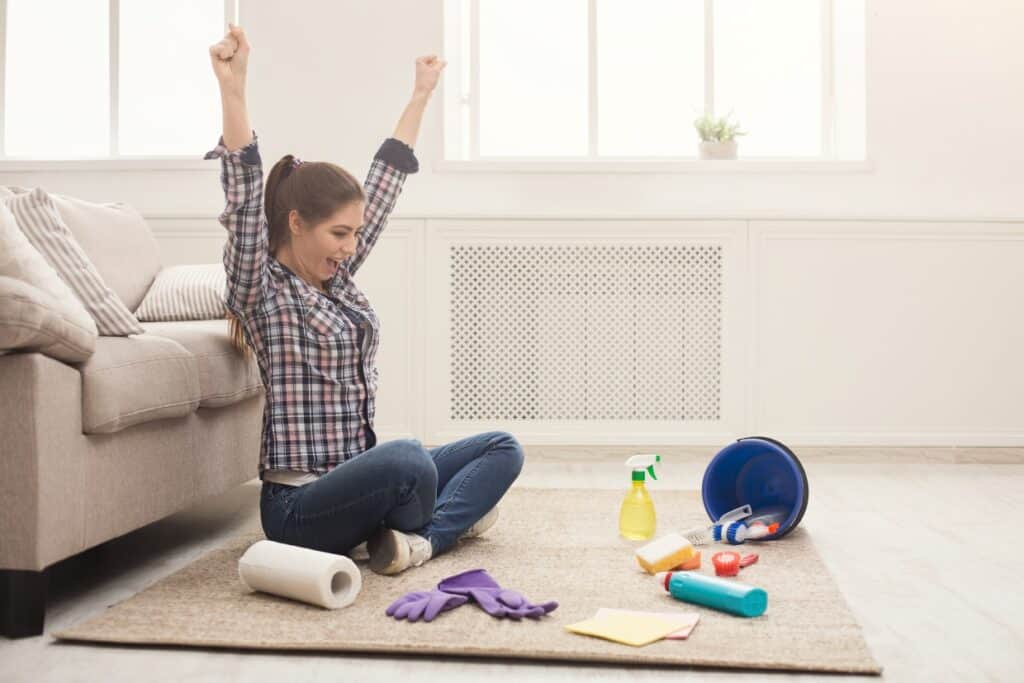Cleaning motivation can sometimes seem elusive, particularly when decluttering a space or keeping up with daily chores. Despite its challenges, being in a clean and organized space can boost mood, increase productivity and promote a sense of well-being. This guide is designed to help get you up and cleaning.

You can personalize cleaning motivation strategies to fit your own needs and lifestyle. Setting small, achievable goals with a reward system for completing tasks can create positive associations with cleaning.
Using the right tools and resources can make the process more efficient and less taxing, encouraging consistent cleaning habits. Over time, these strategies help maintain momentum and develop a lifelong cleaning routine.
Understanding cleaning motivation
To understand your own cleaning motivation, get to the root of why you want to keep things tidy and what benefits you’ll reap from developing a cleaning routine
Psychology behind clutter
There’s plenty of scientific evidence that clutter can significantly impact your mental state; it often represents unfinished business and can lead to feelings of anxiety or stress. Research indicates that clutter can disrupt focus and reduce cognitive resources. Once you recognize this, you’re better prepared to tackle your clutter in a proactive way.
Benefits of a clean space
A clean and organized space offers numerous benefits. It can significantly improve quality of life and well-being by:
- Reducing stress: Clearing clutter can diminish cortisol levels, commonly known as the stress hormone.
- Increasing productivity: An organized environment can enhance focus, increasing efficiency in many areas of life.
- Improving health: Regular cleaning reduces allergens and germs, which can support overall health.
Identifying personal motivators
Personal motivators are unique to each individual and recognizing them can help create a sustainable cleaning routine. They may include personal satisfaction, being prepared for unexpected guests and mental clarity.
Strategies to boost cleaning motivation
You can improve your cleaning motivation by implementing structured strategies. Try these techniques to make cleaning more efficient and less overwhelming.

Create a cleaning schedule
A well-structured cleaning schedule lays out tasks in an orderly fashion. Here is an example of a weekly schedule:
- Monday: Dust the living room surfaces by wiping down all furniture, shelves and electronics, ensuring the living area remains fresh and allergen-free.
- Tuesday: Vacuum the bedrooms. Vacuuming contributes to a healthier sleeping environment by reducing dust and allergens.
- Wednesday: Clean the bathrooms. This involves scrubbing the toilets, sinks, showers and tubs.
- Thursday: Mop the kitchen and dining area. Regular mopping prevents the buildup of dirt and food particles.
- Friday: Tidy up the entryways. Organizing shoes, coats and other items helps make the the entrance more welcoming.
- Saturday: Wash the bedding and curtains. Laundering these not only freshens the rooms but also helps maintain a dust-free environment.
- Sunday: Rest and plan for next week. You can even decide your meal prep schedule simultaneously to determine what type of kitchen clean-up you’ll have at the end of each day.
Focus on decluttering
Decluttering can vastly improve the cleanliness of a space. A useful technique is the four-box method, which involves sorting items into four categories: keep, donate, throw away and store.

Overcoming cleaning challenges
Effective cleaning strategies can alleviate the stress of tidying up a living space. Commencing with manageable steps allows for progress without feeling overwhelmed.
Prevent overwhelm
When facing a cluttered environment, prevent decision paralysis by prioritizing areas needing immediate attention. Write down areas to clean, identify the most pressing areas and assign specific cleaning time slots.
Break down large tasks
To tackle big tasks, it helps to break them down into smaller parts. This makes the whole thing more manageable. Make a checklist to keep track of your progress and stay motivated.
Tools and resources
For a clean and organized home, it’s helpful to use modern resources. This includes cleaning apps and websites that inspire action.
Apps and checklists
Cleaning apps and checklists are crucial for maintaining a tidy environment. Apps offer customizable task lists and reminders to keep cleaning schedules on track. Alternatively, checklists from websites can help break down cleaning into manageable steps.
Having an app on your phone can make finding motivation to clean a lot easier. Try one of these:
- Tody: This app allows users to customize tasks and set reminders, making it easier to stay on top of cleaning schedules. It’s a favorite for those who prefer a structured cleaning routine.
- OurHome: OurHome combines task assignments, making cleaning activities more engaging for family members, especially kids. The app encourages participation through a reward system and shared task lists.
- Unfilth Your Habitat: This app is ideal for those who prefer a more focused approach to cleaning. It’s effective for short, productive bursts of cleaning.
Motivational challenges
Participation in motivational challenges is another effective strategy to make cleaning a habit. These entail a series of tasks for you to complete within a certain timeframe.
- The 20/10 method: This involves completing tasks in intervals of 20 minutes of cleaning followed by a 10-minute break.
- 30-day declutter challenge: This challenge requires participants to declutter different areas or a certain number of items daily for 30 days.
- Trash bag challenge: Fill one trash bag per day with unnecessary items to minimize clutter. Depending on personal goals, you’ll typically do this activity daily over a set time period, such as a week or a month.
“What I found works best is to set mini-cleaning marathons. Every few days, when I have 10 minutes, I will clean a corner of the house: the bathroom vanity, the shelves, etc. In a week, I will have cleaned the whole place.”
— Ksenia Prints, At the Immigrant’s Table
Cleaning podcasts
Podcasts can provide listeners with relatable cleaning journeys and practical tips. Some popular cleaning motivation podcasts include:
- A Slob Comes Clean: This podcast offers practical advice for tackling clutter. It provides a relatable approach to cleaning, making it ideal for those seeking inspiration.
- Clean With Me: This podcast is designed to be listened to while cleaning, offering real-time guidance and encouragement.
“What helps me with motivation is listening to an audiobook or a podcast when cleaning. That way, I still enjoy the process as I get to learn something new that I otherwise wouldn’t have the time to read.”
— Tamara, Thriving In Parenting
Maintaining cleaning momentum
Sustaining a cleaning routine will keep areas of the home in check. To do this, focus on implementing reward systems and regularly reviewing and adjusting cleaning habits.
Reward systems
A well-structured reward system pairs specific cleaning tasks with corresponding rewards. For instance, incentivize mopping and vacuuming the floors with the promise of a special snack or treat.
Regularly review and adjust
Schedule a monthly review session to evaluate the cleaning routine’s effectiveness. Key questions might include:
- What cleaning tasks were consistently completed on time? Which weren’t?
- Which tasks were frequently delayed? Do the tasks need to be broken down into more manageable tasks?
- Is the reward system providing enough cleaning motivation? How can the rewards be improved?
Sara Nelson is the food blogger behind Real Balanced, a site that showcases easy and balanced recipes. Since 2017, she has shared delicious and nutritious recipes with thousands of blog readers and social media followers. Sara lives in Wisconsin with her husband, two children and their dog.